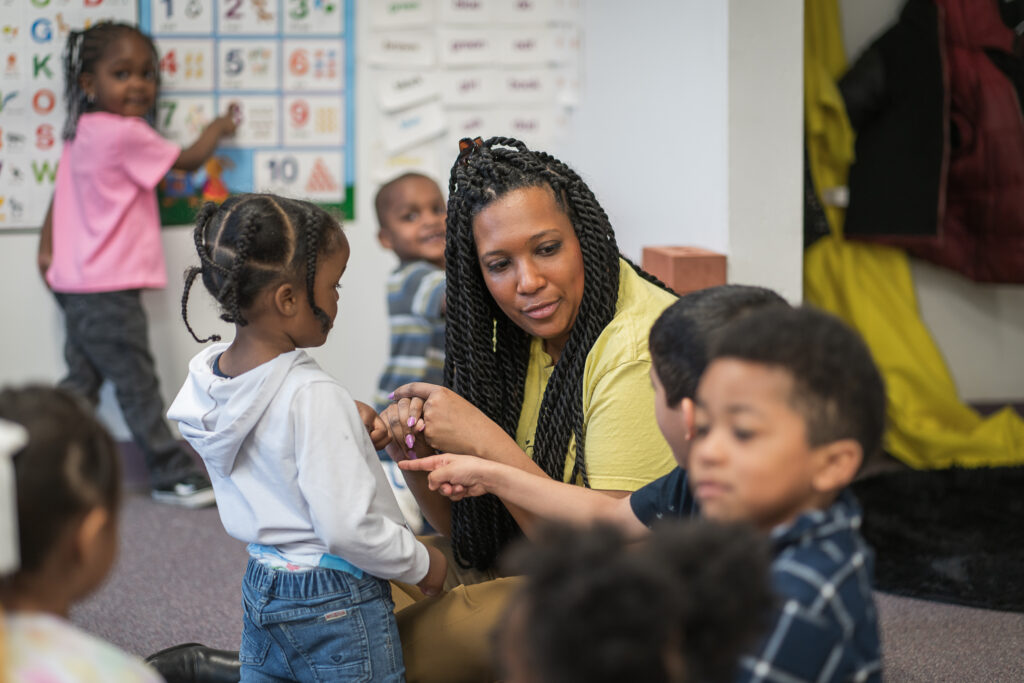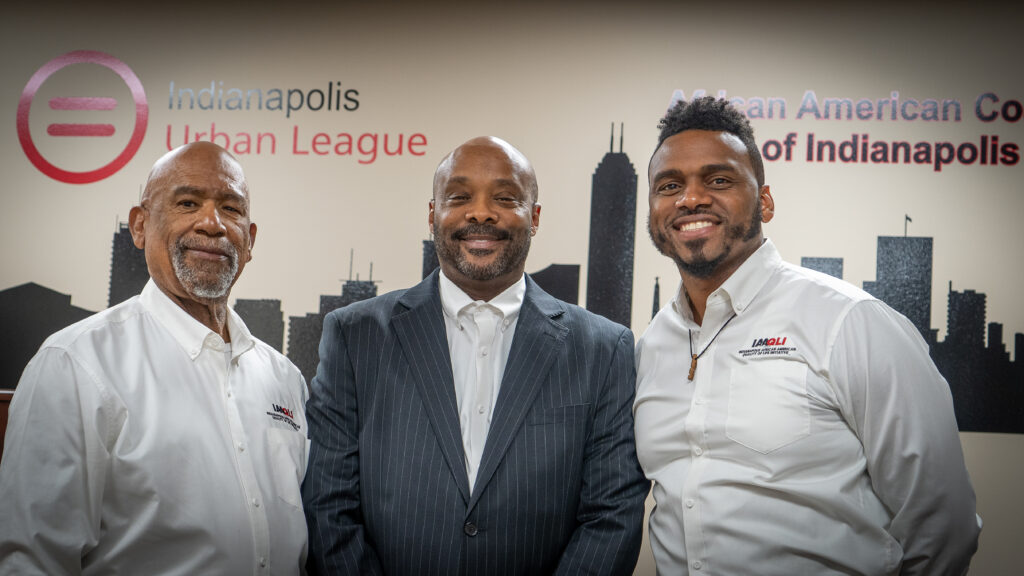2023 Annual Report:
Connecting Early Learning Providers with Valuable Resources
In late 2017, Deandra Thompson embarked on an unpredictable journey—opening an early learning center in her predominantly Black neighborhood on the Near Westside of Indianapolis. At the time, she was pregnant with her first child and unable to find adequate daycare options. “There were no seats in my area. Literally, none of the centers were taking infants at the time,” recalled Thompson, who also faced sticker shock from child care costs. “I knew I wasn’t the only parent experiencing this challenge.”
With previous experience supporting the opening of Phalen Leadership Academy and Providence Cristo Rey High School—two charter schools in Indianapolis—Thompson set out to start a child care center based at the church she attended. The center, A Learning Bee Academy, quickly grew from five children in November 2017 to more than 50 children within a few months. Although the center had a promising start, A Learning Bee Academy, like other grassroots early child care operations, faced challenges with staffing, outfitting classrooms, and the lengthy, rigorous process to become licensed. “Resources were scarce,” recalls Thompson, who found it difficult to attract qualified teachers. “I had to convince people to work for free for a very long time.”

Deandra Thompson founded A Learning Bee Academy preschool in Indianapolis.
Thompson managed the first two years of the operation by primarily relying on retired church members, including an educator and chef, who volunteered to help.
Thompson received a significant boost in 2022 after attending a community meeting where she learned about the Indianapolis African American Quality of Life Initiative (IAAQLI). Funded with a $100 million Lilly Endowment grant in 2020 to the National Urban League, the initiative is a collaboration among the National Urban League, the Indianapolis Urban League, and the African American Coalition of Indianapolis. Its focus: providing financial resources and technical assistance to address critical issues facing Indianapolis’ African American community. (See sidebar for overview of IAAQLI.)
The gathering where Thompson learned about grant opportunities that could help her improve A Learning Bee Academy was one of many that have been foundational to IAAQLI since it began. In 2020 and in 2021 during the height of the COVID-19 pandemic, initiative leaders conducted interviews and held meetings on Zoom and Facebook Live. Those sessions brought together a broad cross section of Indianapolis’ African American residents to talk about their most pressing challenges as well as the most promising opportunities to improve their quality of life. The community conversations helped initiative leaders determine the five priority areas for IAAQLI grantmaking, which are education, business and entrepreneurship, employment, health and wellness, and housing and homeownership.
Subsequent meetings and convenings have helped grant-seeking organizations learn how to apply for funding and have provided technical assistance to those who are new to seeking and receiving philanthropic support. And once grants have been announced, IAAQLI has gathered leaders from the funded organizations for sessions focused on managing grants, reporting about grant funded activities and evaluating their programs and projects.
“I was hopeful about getting support because someone was actually investing in our communities,” says Thompson. “I was impressed that the investment was specifically focused on helping Black families.”
Enabling access
Thompson applied for an IAAQLI grant through the first round of funding and received $200,000 in 2022 to support the expansion of A Learning Bee Academy at its current location at Promise Land Christian Community Church. The grant has enabled the preschool also to open a second location on the eastside of Indianapolis and serve an additional 40 children, infant to age five. In addition, funds have enabled Thompson to provide professional development opportunities for teachers.
The grant to A Learning Bee Academy was one of five made primarily to help organizations increase academic rigor and quality in early childhood education programs, expand service options for children and families, and increase access to training for current early childhood teachers.
 “The intention of this grant opportunity was to grow and expand highly rigorous and accessible quality early childhood programs in the city,” says Karlin Tichenor (shown left), who serves IAAQLI as operations director.
“The intention of this grant opportunity was to grow and expand highly rigorous and accessible quality early childhood programs in the city,” says Karlin Tichenor (shown left), who serves IAAQLI as operations director.
However, when the second round of grant applications came in late 2022, it was clear that some organizations seeking support for their child care and preschool programs were not aware of existing funding opportunities for needs related to facilities improvement, meeting state licensing requirements, curricula development, teacher training and other staff development, Tichenor says. In addition, some of the grant-seeking organizations were not on the Paths to QUALITY, Indiana’s statewide four-level quality rating and improvement system for child care providers. Joining Paths to QUALITY is voluntary but is tied to financial incentives from the state. As programs reach higher levels of quality, they become eligible for additional funding.
“The grantseekers lacked the resources to even get to a point where they could apply to become Level 1 on the Paths to QUALITY,” Tichenor says. “We were expecting them to be further along in that process. If we continue to fund them but don’t move them through the process, whereby they have access to other resources, then we’re not really helping them long term.”
A new opportunity to convene, build connection
Instead of continuing to make grants for early learning programs, the IAAQLI team decided to pause the grantmaking process to ensure that grant-seeking organizations knew how to connect with valuable resources. After all, according to Tichenor, a key goal of IAAQLI funding is to strengthen organizations so that they can thrive well beyond the funding cycle of the initiative.
During that self-imposed pause, the IAAQLI team convened a meeting of early childhood education providers and representatives of Early Learning Indiana (ELI), a statewide nonprofit intermediary organization that helps early learning providers improve their capacity and quality; the Indiana Family and Social Services Administration (FSSA), which manages Paths to QUALITY, distributes federal and state child care funds to families and child care providers and regulates child care statewide; and SPARK Learning Lab, a charitable organization that works with FSSA to provide coaching and other assistance to child care providers. All three entities support early learning providers with resources to help them offer high-quality care.
The meeting became a learning session of sorts, Tichenor says, because it connected a pool of child care providers and preschools that had received funding through IAAQLI in the first round, additional early learning providers, and representatives of FSSA, ELI and SPARK to foster greater understanding of the challenges and the resources available to address them.
“We ultimately wanted our grantees to know how to access the resources that are already available,” Tichenor says. “Then, on the other side, we wanted these organizations to clearly hear from the Black-led organizations.”
Maureen Weber, president and CEO of ELI, says being part of the IAAQLI gathering helped strengthen her organization’s efforts to support child care providers, especially providers who are new to the work. During the meeting, ELI shared with providers information about resources they could access right away, according to Weber. Those included ELI’s fast-track workforce development program to help teachers earn early childhood education training and credentials.
“Our partnership with IAAQLI introduced new child care providers to our current efforts and is helping us make sure that our programming will be better informed by their needs going forward,” Weber says. “Collaborating with IAAQLI has broadened the ELI network while helping us achieve our aim of providing solutions that respond to the evolving challenges facing early learning providers, especially those serving families that need greater access to child care options.”
Opportunity abounds
Leaders with IAAQLI anticipate approving new grants in all areas of the initiative, including early childhood education, in late 2024. Willis Bright, co-director of IAAQLI and chairman of the Indianapolis African American Coalition, says organizations still need to build trust with each other. IAAQLI has been able to make progress by building upon its community gatherings, information sessions for grant seekers, and convenings for grant-funded organizations.
“We are actively working to create opportunities by uniting people through initiatives we’ve launched or funded, inviting them to break down barriers,” Bright says. “The initiative is empowering Black-led organizations to better serve their communities and, eventually, build the relationships and infrastructure needed to compete effectively in the larger ecosystem once the initiative sunsets.”
Tony Mason, president and CEO of the Indianapolis Urban League and co-director of IAAQLI, agrees that the convenings are critically important to IAQQLI because of its mission to be transformational in improving the quality of life for Black residents throughout Indianapolis and Marion County.

Willis Bright, Tony Mason and Karlin Tichenor
“Convenings have afforded us the opportunity to bring into the same room some organizations and community partners who may not have ordinarily worked together,” Mason says. “We have an understanding that if we leverage organizations’ individual and collective strengths, we can do a much better job at meeting the goals and outcomes for a project.”
Though she was pleased to receive a grant, Thompson says involvement in IAAQLI has also inspired her to seek additional engagement with organizations that support early learning providers. For example, she wants her school to achieve the highest level in Paths to QUALITY, which could help A Learning Bee Academy become a model for other providers in the city and state.
Ultimately, Thompson believes that fostering partnerships can lead to a more resilient network of child care providers and thereby improve the quality of early learning experiences for children in the African American community.
“A lot of third graders are getting remediation and, in some cases, get retained because they’re not meeting the standards,” she says.
“These types of collaboration at the early childhood learning level can be key to addressing poor standardized test outcomes among Black elementary students in Indianapolis’ public schools.”
In the long run, the students who are part of high-quality early childhood education programs will gain lifelong benefits, Thompson says.
“Being involved in a preschool experience like ours encourages them to be critical thinkers and learn how to manage their emotions at an early age,” she says. “Our very first students who were infants and toddlers when we opened are now first, second and third graders and are thriving in school socially, emotionally and academically. They will be leveraging these skills for many, many years. It’s a huge advantage.”
In 2020, Lilly Endowment made the grant to the National Urban League to launch the initiative, which is a placed-based effort to address longstanding disparities in education, employment, housing, health outcomes and economic wellbeing that negatively affects African Americans in Indianapolis.